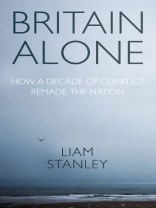When Britain left the European Union in January 2021, it set out on a new journey. Shorn of empire and now the EU too, Britain’s economy is as national as it has ever been. A decade or so since globalisation seemed inevitable, this is a remarkable reversal. How did this happen?
Britain alone argues that this “nationalisation” — aligning the boundaries of the state with its national peoples — emerged from the 2008 global financial crisis. The book analyses how austerity and scarcity intensified and created new conflicts over who gets what. This extends to struggle over what the British nation is for, who it represents, and who it values.
Drawing on a range of cultural, economic, and political themes — immigration and the hostile environment, nostalgia and Second World War mythology, race and the “left behind”, the clap for carers and furloughing, as well as Superscrimpers and stand-up comedy — the book traces the complex nationalist path Britain took after the crash, demonstrating how we cannot explain nationalism without reference to the economy, and vice versa.
In analysing the thread that ties the fallout of the crash and austerity, through Brexit, and to the shape of lockdown politics, Britain alone provides an incisive and original history of the last decade of Britain and its relationship to the global economy.
Mục lục
Introduction
1 A nation in debt
2 Nostalgic visions
3 White Britain
4 From exclusion to inequality
5 In or out
6 Unleashing Britain’s potential
7 Locked down
Conclusion
Acknowledgements
Notes
Index
Giới thiệu về tác giả
Liam Stanley is a Lecturer in the Department of Politics and International Relations at the University of Sheffield and a Fellow of the Sheffield Political Economy Research Institute (SPERI)












